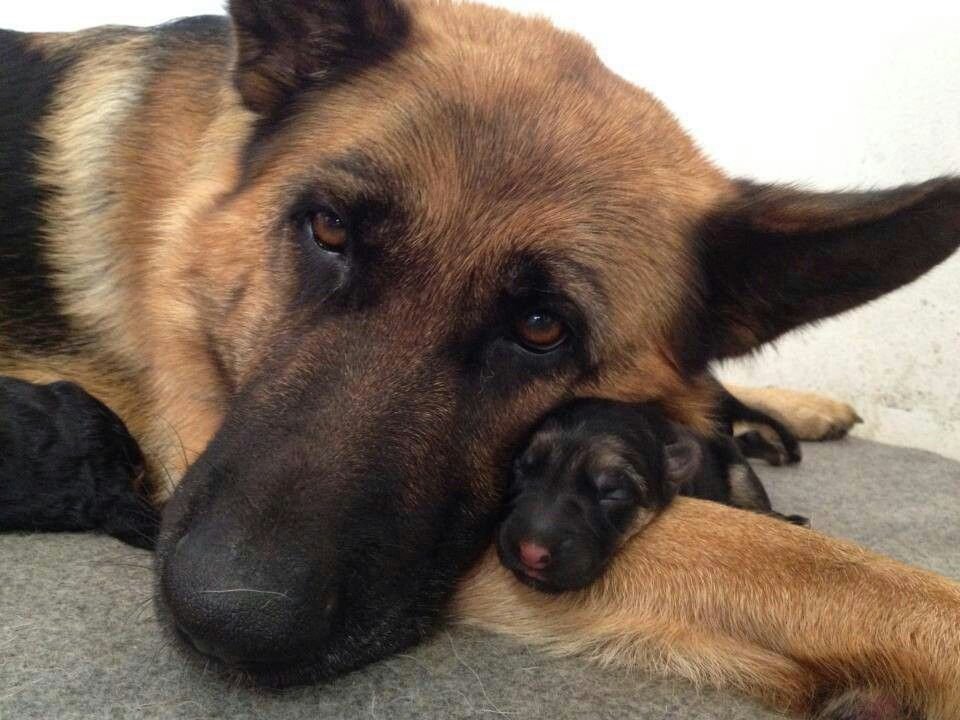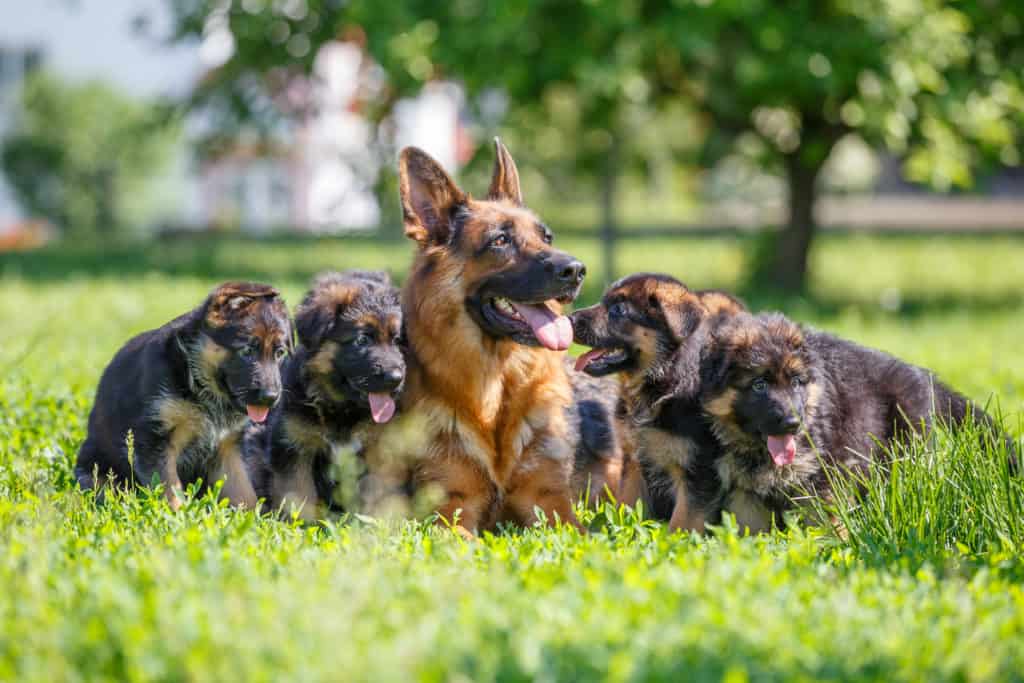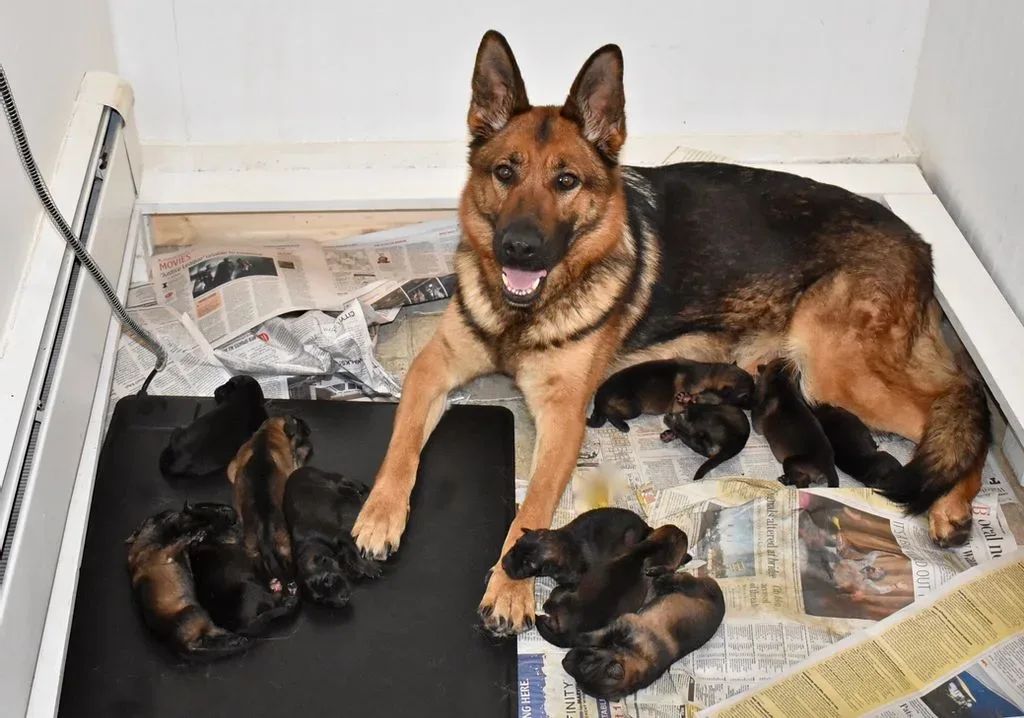German shepherd Puppies will grow big and are agile dogs who are very intelligent and loyal companions. German shepherds need regular health care and exercise.
Table of Contents
Your German shepherd can live a long and happy life and be a lovely companion to you with persistent and careful efforts.
A German shepherd fertilizes in the hot season. Gets pregnant and gives birth to most puppies. If you find that your GSD is pregnant, prepare the necessary items to help her with her litter care.
You should take in-charge if the mother GSD is not producing enough milk and she does not want to take care of the litter.
How many puppies can a GSD litter hold?
German shepherds have very large litter; 2 to 14 puppies in a litter. The average litter size is 8 puppies.

In her first litter, puppies are beyond their mother’s abilities when they have more than 4 puppies. So, some newborns will die or get sick and become very weak if you do not intervene.
What is the gestational period of a GSD?
The gestational period is about 64 days which is slightly longer than the gestation period of other species, due to their large size.
Gestation length in various dogs can vary and depends on several factors, including breed, size of the dog breed, and individual variation i.e. behavior and instinct of the dog.
However, hormone measurements can provide an accurate estimate of gestation length in dogs. Here’s a chart outlining the gestation length in dogs based on accurate hormone measurements:
| Dog Breed | Average Gestation Length (Days) |
|---|---|
| Chihuahua | 58 – 63 |
| Dachshund | 63 – 68 |
| Bulldog | 58 – 63 |
| German Shepherd | 60 – 65 |
| Golden Retriever | 61 – 66 |
| Labrador Retriever | 59 – 64 |
| Poodle | 59 – 65 |
| Beagle | 59 – 65 |
| Boxer | 60 – 65 |
| Rottweiler | 59 – 64 |
Please note that these values are averages and individual dogs may have slight variations.
Getting Ready for Delivery
Before giving birth to its babies, a female German shepherd begins exploring private and safe places for her puppies (this process is called nesting).
For the comfort of the mother and the safety of the puppy, keep some blankets and towels in the whelping box. She begins to spend more time in her nest.
This way you will not have to distribute her puppies in hidden places.
German shepherd puppies are born blind, deaf and toothless, yet with a tendency to breastfeed and the ability to crawl toward the warmth of their mother’s body.
Taking Care of German shepherd Puppies
Newborns cannot see or hear until 5 to 8 days of age. Puppies do not stand until at least 2 to 4 weeks of age. Same for the barking behavior.
If left in the litter or orphaned, or if its mother is unable to produce enough milk, or if the suckle reflex for the puppy is poor, ask your vet for the Lactose-Free weaning milk prescribed for German Shepherd Puppies.

Check if the temperature is warm enough as the puppies cannot control their temperature at this stage. During the first week of puppies, the room should be between 30º and 32ºC. For the second week, it can be slightly reduced between 26º and 28º and around 22º after the third week.
You do not need to bathe them this time, because the mother GSD cleans her litter by constantly pressing.
If the puppies are orphaned, you can wash them gently using a warm and damp cloth. Don’t forget to change the mattresses daily to keep the area clean and dry to avoid discomfort.
Post-Delivery German Shepherd Care
Monitor the delivery process. Mothers (for German shepherds), depending on her experience and the size of the litter, work an average of 6 to 18 hours, usually to deliver 5-10 puppies.
When new contractions begin, arrange the already-born puppies with a heating pad fitted in a small box and keep them away until the next puppy is born.
Immediately after birth, check that each puppy is breathing properly. Observe closely their movements to make sure there are no faded puppies.
German shepherd giving birth for the first time
Usually, after birth, the mother cuts the umbilical cord and cleans the puppies by gently pressing their bodies.
She starts with the genitals, then the legs complete with the rest of the body. She may not do so if she has no experience, or when she is exhausted after childbirth.
Use a disinfectant to clean the cords and a clean towel to gently massage the puppy’s body until it dries.
Immediately after delivery, the mother cannot secrete milk, but the yellow substance is “colostrum”. This colostrum is very nutritious for babies. It is very important in strengthening their immunity as it transmits their mother’s natural antibodies.
In fact, 80 to 90% of new-born puppies die, as they could not benefit from colostrum.
Hygiene
Mother GSD, by licking its genital area, encourages her litter to urinate or defecate, but if left in the litter, you should stimulate them with potty cleaning essentials because new-borns cannot do this on their own till the first 2 weeks of life.
Gently massage the anal area using a damp cotton ball or washcloth. Use a suction bulb syringe if something obstructs the nasal passages of the puppy.
Also Read: When do German shepherd ears Stand up naturally?
Track the growth and condition of each puppy. Using the Baby Scale, weigh each puppy immediately after birth and log its weight.
Healthy German Shepherd puppies weight is about 0.8 to 1.3 pounds at birth and 1.6 to 2.1 pounds by the end of the first week.
2-week-old German shepherd puppies care
Healthy puppies are plump and firm and nurse every two hours or until their bellies are round.
Well-fed puppies sleep quietly, while air-swallowing puppies appear to be well-fed, but behave satisfactorily, initially crying and wandering around a lot, then, not moving enough.
Also Read: Adopting a German Shepherd Advice
Start training your GSD puppy when he is 5-6 weeks old. Provide high-quality solid food as the mother’s milk production of GSD begins to slow down.
German Shepherd puppies are completely weaned and completely independent from their mother by 8 weeks of age, so it is best to train them to avoid behavioral problems. If puppies are not trained to be considered completely stupid, train them now.
Here’s a chart detailing the care and development of 2-week-old German Shepherd puppies:
| Aspect | Details |
|---|---|
| Feeding | Puppies are still nursing and dependent on their mother’s milk. |
| If necessary, bottle feeding with a canine milk replacement formula can be introduced, following veterinarian guidelines. | |
| Puppies should be fed every 2-3 hours, including overnight. | |
| Weaning | Introduce a small amount of softened puppy food to start the weaning process. Consult with a veterinarian for appropriate food and feeding guidelines. |
| Start offering puppy food mixed with milk replacement formula, gradually reducing the formula over time. | |
| Begin to introduce the puppies to lapping from a shallow dish of water. | |
| Socialization | Continue handling and gentle interactions to build trust and positive associations with humans. |
| Introduce the puppies to new sounds, sights, and experiences in a controlled and safe manner. | |
| Allow supervised playtime with littermates to encourage socialization and development of motor skills. | |
| Veterinary Check-up | Schedule a veterinary visit for a check-up, deworming, and vaccination recommendations. |
| The vet can assess the puppies’ health, growth, and provide necessary guidance for their care. | |
| Hygiene and Cleanliness | Clean the whelping area regularly, ensuring a warm, dry, and comfortable environment. |
| Puppies may begin to crawl and explore, so provide a safe space with appropriate bedding. | |
| Gently stimulate the puppies’ elimination by using a warm, damp cloth after each feeding. | |
| Monitor the puppies for any signs of illness or abnormalities and seek veterinary assistance if necessary. | |
| Sleep and Rest | Puppies spend most of their time sleeping and should have a designated area for uninterrupted rest. |
| Ensure the sleeping area is quiet, warm, and away from drafts or excessive noise. | |
| Provide soft bedding or blankets for comfort. |
Checklist of essential items for the Newborn German Shepherd Puppies and Mother
Here is a list of things newborn German Shepherd puppies and their mother need:
For Mom
- Whelping Box: A safe and comfortable place for a mother to give birth and nurse her puppies.
- Bedding: soft, clean bedding for the whelping box to keep mother and puppies warm and comfortable.
- Food and water bowls: Provide easily accessible bowls for the mother to have food and water.
- High-quality dog food: Provide a balanced and nutritious diet that meets the needs of the mother during pregnancy and lactation. Consult a veterinarian for specific recommendations.
- Freshwater: Ensure a constant supply of clean, fresh water to keep the mother hydrated.
- Nutritional Supplements: Talk to your vet about any supplements or vitamins needed to support the mother’s health during this period.
- Medical Supplies – Keep a first aid kit on hand that includes items such as wound cleansers, gauze pads, and other basic medical supplies in case of emergencies or complications.
For newborn puppies
- Help Box: A safe and warm environment for puppies to grow and develop.
- Bedding: Soft, clean bedding to keep pups warm and comfortable.
- Heat source: A heat lamp or heating pad is set to a low temperature to provide adequate warmth for puppies, since they are initially unable to regulate their body temperatures.
- Milk Replacement Formula – If nursing is not possible or additional supplementation is required, a high-quality canine milk replacement formula is available.
- Nursing bottles or syringes – can be used to provide supplementary feeding if puppies are unable to nurse from their mother or if necessary.
- Warm Wet Puppy Wipes or Washcloths – To gently clean puppies after taking them out.
- Weight standard: Check the weight of the puppies regularly to ensure proper growth and development.
- Vet Contact Information – Have the contact details of a veterinarian with experience caring for puppies handy for any emergencies or questions.
- Identification bands: Use different colored bands or collars to help distinguish between puppies and track their progress.
- Socialization and nurturing toys: As puppies get older, introduce appropriate toys and objects to stimulate their senses and encourage early socialization.
Remember to consult a veterinarian for personalized recommendations and guidance based on your specific situation and the needs of your German Shepherd mother and puppies.
FAQs on New Born German Shepherd Puppy and Mother Care
How often should the mother German Shepherd be fed during the nursing period?

The mother should be given small, frequent meals throughout the day to support her energy requirements while feeding the puppy or during nursing. Consult with a veterinarian for specific feeding guidelines based on the mother’s individual needs.
How often should newborn German Shepherd puppies be nursed?
Puppies should nurse from their mother every 1 to 2 hours during the first few weeks of life. They have small stomachs and need frequent feedings to meet their nutritional needs.
When should I start introducing solid food to the puppies?
Solid food introduction typically begins around 3 to 4 weeks of age. Start by offering softened puppy food mixed with milk replacement formula, gradually transitioning them away from exclusive nursing. Consult with a veterinarian for specific recommendations.
How do I keep the whelping area clean?
Clean the whelping area regularly to maintain hygiene. Remove soiled bedding promptly, wipe down surfaces, and replace it with fresh, clean bedding. Use pet-safe disinfectants as recommended by your veterinarian.
When can I start weaning the puppies from their mother?
Weaning usually begins around 3 to 4 weeks of age when puppies start showing interest in solid food. Gradually introduce softened puppy food and reduce the amount of milk replacement formula or nursing sessions. Monitor their progress and consult with a veterinarian for guidance.
Final Thoughts
In conclusion, newborn German Shepherd puppies and their mother require special care and dedication. Here are some key points to keep in mind:
- Proper nutrition is very important for mother and puppies. Make sure the mother gets a balanced diet that meets her needs during pregnancy and lactation. Consult a veterinarian for specific dietary recommendations.
- Newborn babies depend on breast milk for nutrition. Make sure they nurse frequently, usually every 1 to 2 hours to meet their nutritional needs. Monitor their weight gain to make sure they are thriving.
- Provide a clean and comfortable helping area for mother and baby. Keep the area warm, dry and draft-free. Clean and replace bedding regularly to maintain cleanliness.
- Gradually introduce solid food to puppies at 3 to 4 weeks of age. Start with soft puppy food and gradually transition them away from exclusive nursing. Check with a veterinarian for specific feeding guidelines.
- Socialize puppies from an early age. Handle them carefully, expose them to different sights and sounds, and introduce positive human interactions. This helps them develop into well-adjusted and sociable dogs.
- Look for any illness or abnormalities in the mother or puppies. Seek veterinary help immediately if you notice anything concerning.
- Follow your vet’s recommended vaccination and deworming schedules to protect puppies from common diseases.
Remember, every German Shepherd mother and her puppies are unique, so it’s important to consult a veterinarian experienced in puppy care for personalized guidance and support. By providing proper nutrition, a safe environment, and early socialization, you can give newborn German Shepherd puppies the best start in life and ensure the well-being of both mother and her precious offspring.

